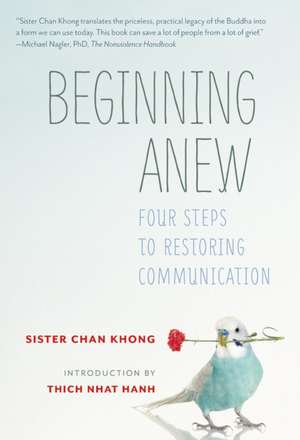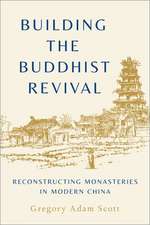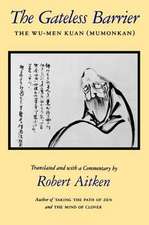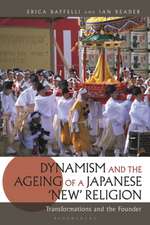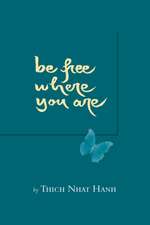Beginning Anew
Autor Chan Khongen Limba Engleză Paperback – 19 feb 2015
In Beginning Anew, Sister Chân Không shares a concrete, four-part process that can help anyone heal relationships. Thousands have been introduced to this practice at the retreats led worldwide by Thich Nhat Hanh.
When we’re upset with someone, we’re often afraid to say anything. We tell ourselves, “It’s just a small matter; it’s not important.” But the accumulation of many small issues can cause relationships to break. Beginning Anew gives us a way to address problems when they’re small.
Sister Chân Không brings the practice to life by sharing stories of couples and families she has helped to reconcile.
After a few minutes of quietly sitting together, each person speaks without being interrupted. The first step is to express appreciation of the other person, something we may forget to do and that can lead to people feeling taken for granted. The second step is to express any regrets we have. This is something we often put off, but it gives the chance to directly address any problems in the relationship. The last two steps are for expressing anger and checking in with each other. When practiced regularly, these steps bring deeper understanding and harmony to any relationship.
When we’re upset with someone, we’re often afraid to say anything. We tell ourselves, “It’s just a small matter; it’s not important.” But the accumulation of many small issues can cause relationships to break. Beginning Anew gives us a way to address problems when they’re small.
Sister Chân Không brings the practice to life by sharing stories of couples and families she has helped to reconcile.
After a few minutes of quietly sitting together, each person speaks without being interrupted. The first step is to express appreciation of the other person, something we may forget to do and that can lead to people feeling taken for granted. The second step is to express any regrets we have. This is something we often put off, but it gives the chance to directly address any problems in the relationship. The last two steps are for expressing anger and checking in with each other. When practiced regularly, these steps bring deeper understanding and harmony to any relationship.
Preț: 60.99 lei
Preț vechi: 74.51 lei
-18% Nou
Puncte Express: 91
Preț estimativ în valută:
11.67€ • 12.72$ • 9.83£
11.67€ • 12.72$ • 9.83£
Carte disponibilă
Livrare economică 02-09 aprilie
Livrare express 18-22 martie pentru 28.17 lei
Preluare comenzi: 021 569.72.76
Specificații
ISBN-13: 9781937006815
ISBN-10: 1937006816
Pagini: 128
Dimensiuni: 112 x 163 x 13 mm
Greutate: 0.11 kg
Editura: Parallax Press
ISBN-10: 1937006816
Pagini: 128
Dimensiuni: 112 x 163 x 13 mm
Greutate: 0.11 kg
Editura: Parallax Press
Recenzii
"We live in a very stressful, alienating world. Beginning Anew can save a lot of people from the corrosive effects of that alienation, and the grief that it brings, in their personal relationships. Sister Chân Không has once again translated the priceless, practical legacy of the Buddha into a form we can use today.”—Michael Nagler, PhD The Nonviolence Handbook
"The moving language in this book inspires and guides while laying out elegantly simple practices for healing and maintaining relationships. For those struggling with communication knots, or seeking to bring out the best in themselves and others relationally, it offers remarkable wisdom, freshness and clarity."—Jennifer Freeman, Marriage and Family Therapist, Co-author, Playful Approaches to Serious Problems
"The moving language in this book inspires and guides while laying out elegantly simple practices for healing and maintaining relationships. For those struggling with communication knots, or seeking to bring out the best in themselves and others relationally, it offers remarkable wisdom, freshness and clarity."—Jennifer Freeman, Marriage and Family Therapist, Co-author, Playful Approaches to Serious Problems
Notă biografică
Sister Chân Không is the author of Learning True Love and Deep Relaxation. She is a Buddhist nun with students and readers around the world. Born in a village on the Mekong River Delta in 1938, she has devoted her life to the development and practice of nonviolence grounded in the Buddhist precepts of non-killing and compassionate action. At the age of 21 she became part of the community of Zen Master Thich Nhat Hanh. She lives at his monastery in Plum Village, France.
Thich Nhat Hanh is one of the best-known Zen Buddhist teachers in the world today. His best-selling books include Happiness and Peace Is Every Step. He lives in Plum Village, in southwest France, where he gardens, writes, and teaches the art of mindful living.
Thich Nhat Hanh is one of the best-known Zen Buddhist teachers in the world today. His best-selling books include Happiness and Peace Is Every Step. He lives in Plum Village, in southwest France, where he gardens, writes, and teaches the art of mindful living.
Extras
Anger is not a stranger who shows up unexpectedly; it doesn’t come all at once. Usually, we have a lot of little hurts or annoyances and we don’t express them until they become so big that we explode.
Often a couple who has been together for many years will come to me for advice because hurts have accumulated over time and their relationship has come to the breaking point. One woman told me that she had been hurt by something her husband said on their first day of marriage, over thirty years before. But because it was the beginning, she hadn’t wanted to start a fight, so she didn’t mention it. “That’s okay,” she said to herself, “it’s not a big issue.” But the hurt remained in her for thirty years and as more hurts accumulated she couldn’t bear it anymore and she decided to leave him. Hurt, accumulated over time, is called an internal knot because it’s so hard to untangle. If you have an internal knot, don’t wait until it becomes so tight it can’t be undone.
I’ve spent many years teaching a practice called Beginning Anew. The practice consists of four steps that can transform our relationships, even when there is a big wall of anger between us and the other party. But the most transformational part happens before we even begin those four steps. First, before anything else, we need to take care of ourselves and our anger. Often when we’re angry, the feeling is so strong that it tricks us into thinking we need to communicate it right away. We want to fix the other person or prove that they’re wrong. But when you’re drowning, you can’t save someone else. You need to take care of yourself first.
When you’re angry and you shout at someone, he won’t listen. He’ll be afraid of your anger and try to escape, deny culpability, or fight back. Even if you don’t shout or say something harsh, any anger you feel will show on your face and people around you will be able to tell that something isn’t right. Don’t swallow your anger and try not to show it. Swallowing your anger means it gets lodged deep inside you, which can make you sick and unhappy. Being calm doesn’t mean hiding your anger; it means taking the time to sit with it, so that you’re not controlled by it and you have a chance to restore harmony in your relationships.
The first thing to do is to notice your anger and name it. This is a good time to not talk and to instead come back to yourself and pay attention to your in-breath and out-breath. Deliberately take your focus away from the situation or the person who angered you and dwell on the air entering your nostrils, going into the bronchia, and spreading through your lungs. Breathing out, focus completely on the air going out of your body. Somebody may have done something terrible, but at least you have the time to breathe in and out.
In the moment when you’re full of anger, it can be very difficult to remember your breathing. If you have access to a bell or the sound of a bell on your phone or computer, you can use that sound as a reminder to return to your breathing. It can also be helpful to remove yourself from the person who is the target of your anger. Go for walk and feel the earth under your feet. Walk and breathe and take your time. There is nothing to lose and a lot to gain by taking a few moments for yourself.
In our monastic community, we have one sister who is wonderful but very quick to anger. She knows this. In meetings she often gets upset by something another sister says. Whenever this happens, she gets up very quickly like an arrow, and leaves to go for a walk. When she comes back, she is smiling and can sit down peacefully again. Having refreshed herself, she is able to listen.
It’s very hard to listen when we’re angry. Our anger changes our perceptions. When we’re angry, we feel we have a right to be angry, because things didn’t happen in the way we wanted or expected them to. Anger is natural and is part of us. But remember that when we’re angry, we may not be seeing things clearly. When we focus our attention on our breath, we calm our mind. When our mind is calm, we can see more clearly. Our mind is like the surface of a lake. When the lake is calm, it clearly reflects everything in the scene above. When the lake is agitated by a strong wind, we only see broken up pieces of color. If there's a full moon, we’ll just see scattered bits of gold here and there; we won’t see the whole full moon. When we’re angry, we only perceive one part of the reality. So it's better not to act right away, when our perception is not clear.
Our perception is always at least a little wrong. As long as we’re not enlightened, we can’t see the whole reality of a person, a group, or a situation. The Buddha said we are like a blind person who touches an elephant’s tail and thinks it is a broom because he can’t see the whole animal.
The awareness that our perception is always partial helps us to be humble. When you see something a certain way, question your certainty. You could be wrong or you could be seeing just one part of the person or situation. In order to see deeply, we need to practice stopping, samatha. We need to stop all thinking, release our mind from the object of our anger, and allow our mind to become calm so that we can see more clearly. Any time we are filled with a strong emotion, such as anger or infatuation, our perceptions are particularly blind. When we are so enthusiastic in our anger or our love, we are full of that emotion and have a strong urge to act on that feeling right away. But in such situations, we are only seeing a small part of the reality, and so we can easily make rash decisions and act in ways that end up being hurtful to ourselves and others. To mistake an elephant for a broom is not a serious problem. But if we hastily choose a life partner or hurt a person in anger, we might suffer the consequences for a long time.
The practice of Beginning Anew can help people resolve difficulties and communicate when they are hurt, but it isn’t a practice to do in the heat of anger. You can start Beginning Anew at any time, but it has the strongest effect if you start practicing when you’re feeling good toward the other person before the anger takes root. If you set aside time to communicate in this way each week, then when there is hurt or anger, you can resolve it much more quickly and easily. To Begin Anew, set aside a regular agreed-upon thirty minutes and choose a space where you will both be comfortable, not rushed, and feel able to speak freely. The practice has four parts, but if you don’t have time for all four each week, even doing the first part for ten or fifteen minutes will transform the communication your relationship.
Step One: Flower Watering
The four parts of the practice are flower watering, expressing regret, expressing hurt or disagreement, and asking for more information. The first step is to show appreciation for the other person. This is called flower watering. While one person speaks, the other person just listens as he or she is appreciated. When you aren’t having a problem with someone, it’s easy to remember his or her wonderful qualities. So it might help to keep a notebook or a file folder on your computer where you list all the things about your loved one that bring you happiness. Sometimes, a loved one does something thoughtful for us, or does something that expresses a talent or quality that we appreciate, but we are too busy to thank them. You can take notes to help you remember.
Flower watering also can be done at work. Sometimes in the office a colleague does good work but we take her for granted. When she makes a mistake, however, we might say right away, “Why did you do that?” In the work environment, you can make time for people to appreciate each other on a regular basis. With flower watering, you begin to create a culture of appreciation in which people are able to listen and feel supported by each other. Then, if you want to let someone know that something they’re doing isn’t working, they’ll more likely be able to hear it. Sometimes we really appreciate someone, but we keep it inside. Then when we disagree about something and speak out, that person thinks that we don’t appreciate them.
In the family, it works well to choose one day a week to practice Beginning Anew. Choose a time when all the members of the family can be together. Sit together silently for a few moments so everybody can follow their breath and calm their body and mind. Then, one person speaks at a time while the others listen and continue to breathe. Everyone gets a turn. Be sure to share appreciation even when there is no hurt or anger that you want to address. One man said to me, “For many months my wife won’t say anything. When she starts to appreciate me, I know it’s because she’s about to complain.” Also note that sometimes people begin to express appreciation automatically, mechanically. Make sure there is something genuine that you truly appreciate about each person, something specific. Genuine flower watering will keep your relationships healthier and happier and more resilient when there is a difficulty to express.
Step Two: Expressing Regret
The second step is expressing regret or apologizing for anything you would like to have done differently or better. If you see you’ve made a mistake, you need to have the courage to apologize before it becomes a knot in your colleague, partner, friend, or loved one.
When you truly apologize for something you regret, any hurt the person felt may be completely dissipated by your apology. Expressing regret on your own initiative, before the other person has even let you know that he or she is hurt, is a way to refresh your relationship. Even if you are apologizing for only part of a situation, if your regret is genuine, the other person will hear it and feel some release.
Step Three: Expressing Hurt or Disagreement
Because each of us has perceptions that get in the way of truly seeing, we need to let other people know when we are hurt. Perhaps we think they should already know how we feel or perhaps we believe that they hurt us intentionally, but often their perceptions are clouded—as ours are—and they don’t know how they have hurt us. The difficulty we perceive may not be as big a difficulty as we perceive it to be. We may just see things differently from the other person. If we live with someone or see them at work every day and we don’t express our hurt or disagreement, then we stop being present around them; we retreat. That’s why it is so important to express your hurt or disagreement. You may be scared to speak, but if you speak from a place of calm and love, you will be speaking in a way that is easier for the other person to hear.
There are two ways to behave when you are angry. You can speak as if you are throwing your words out like darts, and the other person will shut their heart and be like a wall. Or you can speak in a humble way and the other person will open
Often a couple who has been together for many years will come to me for advice because hurts have accumulated over time and their relationship has come to the breaking point. One woman told me that she had been hurt by something her husband said on their first day of marriage, over thirty years before. But because it was the beginning, she hadn’t wanted to start a fight, so she didn’t mention it. “That’s okay,” she said to herself, “it’s not a big issue.” But the hurt remained in her for thirty years and as more hurts accumulated she couldn’t bear it anymore and she decided to leave him. Hurt, accumulated over time, is called an internal knot because it’s so hard to untangle. If you have an internal knot, don’t wait until it becomes so tight it can’t be undone.
I’ve spent many years teaching a practice called Beginning Anew. The practice consists of four steps that can transform our relationships, even when there is a big wall of anger between us and the other party. But the most transformational part happens before we even begin those four steps. First, before anything else, we need to take care of ourselves and our anger. Often when we’re angry, the feeling is so strong that it tricks us into thinking we need to communicate it right away. We want to fix the other person or prove that they’re wrong. But when you’re drowning, you can’t save someone else. You need to take care of yourself first.
When you’re angry and you shout at someone, he won’t listen. He’ll be afraid of your anger and try to escape, deny culpability, or fight back. Even if you don’t shout or say something harsh, any anger you feel will show on your face and people around you will be able to tell that something isn’t right. Don’t swallow your anger and try not to show it. Swallowing your anger means it gets lodged deep inside you, which can make you sick and unhappy. Being calm doesn’t mean hiding your anger; it means taking the time to sit with it, so that you’re not controlled by it and you have a chance to restore harmony in your relationships.
The first thing to do is to notice your anger and name it. This is a good time to not talk and to instead come back to yourself and pay attention to your in-breath and out-breath. Deliberately take your focus away from the situation or the person who angered you and dwell on the air entering your nostrils, going into the bronchia, and spreading through your lungs. Breathing out, focus completely on the air going out of your body. Somebody may have done something terrible, but at least you have the time to breathe in and out.
In the moment when you’re full of anger, it can be very difficult to remember your breathing. If you have access to a bell or the sound of a bell on your phone or computer, you can use that sound as a reminder to return to your breathing. It can also be helpful to remove yourself from the person who is the target of your anger. Go for walk and feel the earth under your feet. Walk and breathe and take your time. There is nothing to lose and a lot to gain by taking a few moments for yourself.
In our monastic community, we have one sister who is wonderful but very quick to anger. She knows this. In meetings she often gets upset by something another sister says. Whenever this happens, she gets up very quickly like an arrow, and leaves to go for a walk. When she comes back, she is smiling and can sit down peacefully again. Having refreshed herself, she is able to listen.
It’s very hard to listen when we’re angry. Our anger changes our perceptions. When we’re angry, we feel we have a right to be angry, because things didn’t happen in the way we wanted or expected them to. Anger is natural and is part of us. But remember that when we’re angry, we may not be seeing things clearly. When we focus our attention on our breath, we calm our mind. When our mind is calm, we can see more clearly. Our mind is like the surface of a lake. When the lake is calm, it clearly reflects everything in the scene above. When the lake is agitated by a strong wind, we only see broken up pieces of color. If there's a full moon, we’ll just see scattered bits of gold here and there; we won’t see the whole full moon. When we’re angry, we only perceive one part of the reality. So it's better not to act right away, when our perception is not clear.
Our perception is always at least a little wrong. As long as we’re not enlightened, we can’t see the whole reality of a person, a group, or a situation. The Buddha said we are like a blind person who touches an elephant’s tail and thinks it is a broom because he can’t see the whole animal.
The awareness that our perception is always partial helps us to be humble. When you see something a certain way, question your certainty. You could be wrong or you could be seeing just one part of the person or situation. In order to see deeply, we need to practice stopping, samatha. We need to stop all thinking, release our mind from the object of our anger, and allow our mind to become calm so that we can see more clearly. Any time we are filled with a strong emotion, such as anger or infatuation, our perceptions are particularly blind. When we are so enthusiastic in our anger or our love, we are full of that emotion and have a strong urge to act on that feeling right away. But in such situations, we are only seeing a small part of the reality, and so we can easily make rash decisions and act in ways that end up being hurtful to ourselves and others. To mistake an elephant for a broom is not a serious problem. But if we hastily choose a life partner or hurt a person in anger, we might suffer the consequences for a long time.
The practice of Beginning Anew can help people resolve difficulties and communicate when they are hurt, but it isn’t a practice to do in the heat of anger. You can start Beginning Anew at any time, but it has the strongest effect if you start practicing when you’re feeling good toward the other person before the anger takes root. If you set aside time to communicate in this way each week, then when there is hurt or anger, you can resolve it much more quickly and easily. To Begin Anew, set aside a regular agreed-upon thirty minutes and choose a space where you will both be comfortable, not rushed, and feel able to speak freely. The practice has four parts, but if you don’t have time for all four each week, even doing the first part for ten or fifteen minutes will transform the communication your relationship.
Step One: Flower Watering
The four parts of the practice are flower watering, expressing regret, expressing hurt or disagreement, and asking for more information. The first step is to show appreciation for the other person. This is called flower watering. While one person speaks, the other person just listens as he or she is appreciated. When you aren’t having a problem with someone, it’s easy to remember his or her wonderful qualities. So it might help to keep a notebook or a file folder on your computer where you list all the things about your loved one that bring you happiness. Sometimes, a loved one does something thoughtful for us, or does something that expresses a talent or quality that we appreciate, but we are too busy to thank them. You can take notes to help you remember.
Flower watering also can be done at work. Sometimes in the office a colleague does good work but we take her for granted. When she makes a mistake, however, we might say right away, “Why did you do that?” In the work environment, you can make time for people to appreciate each other on a regular basis. With flower watering, you begin to create a culture of appreciation in which people are able to listen and feel supported by each other. Then, if you want to let someone know that something they’re doing isn’t working, they’ll more likely be able to hear it. Sometimes we really appreciate someone, but we keep it inside. Then when we disagree about something and speak out, that person thinks that we don’t appreciate them.
In the family, it works well to choose one day a week to practice Beginning Anew. Choose a time when all the members of the family can be together. Sit together silently for a few moments so everybody can follow their breath and calm their body and mind. Then, one person speaks at a time while the others listen and continue to breathe. Everyone gets a turn. Be sure to share appreciation even when there is no hurt or anger that you want to address. One man said to me, “For many months my wife won’t say anything. When she starts to appreciate me, I know it’s because she’s about to complain.” Also note that sometimes people begin to express appreciation automatically, mechanically. Make sure there is something genuine that you truly appreciate about each person, something specific. Genuine flower watering will keep your relationships healthier and happier and more resilient when there is a difficulty to express.
Step Two: Expressing Regret
The second step is expressing regret or apologizing for anything you would like to have done differently or better. If you see you’ve made a mistake, you need to have the courage to apologize before it becomes a knot in your colleague, partner, friend, or loved one.
When you truly apologize for something you regret, any hurt the person felt may be completely dissipated by your apology. Expressing regret on your own initiative, before the other person has even let you know that he or she is hurt, is a way to refresh your relationship. Even if you are apologizing for only part of a situation, if your regret is genuine, the other person will hear it and feel some release.
Step Three: Expressing Hurt or Disagreement
Because each of us has perceptions that get in the way of truly seeing, we need to let other people know when we are hurt. Perhaps we think they should already know how we feel or perhaps we believe that they hurt us intentionally, but often their perceptions are clouded—as ours are—and they don’t know how they have hurt us. The difficulty we perceive may not be as big a difficulty as we perceive it to be. We may just see things differently from the other person. If we live with someone or see them at work every day and we don’t express our hurt or disagreement, then we stop being present around them; we retreat. That’s why it is so important to express your hurt or disagreement. You may be scared to speak, but if you speak from a place of calm and love, you will be speaking in a way that is easier for the other person to hear.
There are two ways to behave when you are angry. You can speak as if you are throwing your words out like darts, and the other person will shut their heart and be like a wall. Or you can speak in a humble way and the other person will open
